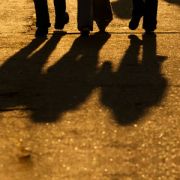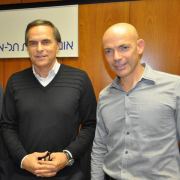Expert Analysis: Israel Goes to the Polls Once Again
Just a couple of days before Israel’s general elections, Prime Minister Benjamin Netanyahu appears to be the certain victor. In fact, no other Israeli politician is seriously in contension for the job. This is a remarkable political development, reminiscent perhaps only of David Ben Gurion's monopoly of power in the 1950's. Indeed, most polls show the Likud-led right-wing bloc (including the ultra-Orthodox parties) is likely to win around 65 of the 120 seats. Interestingly, the fact that Netanyahu is so ahead in the polls is not an indication of his great popularity, as only aboutone quarter of the population is likely to vote for him. It is rather an indication of the poor leadership of his rivals, primarily in the political center.
Kadima, the largest centrist party in the 2009 elections, completely collapsed, and it's uncertain whether its head Shaul Mofaz will even cross the electoral threshold. Moreover, in the current election campaign, Netanyahu, who likes to present himself as a strong leader, is being attacked from all sides of the political spectrum as an indecisive and even reckless leader. These attacks come not only from politicians like Sheli Yechimovich, leader of the renewed Labor Party, and former Foreign Minister Tzipi Livni, who now heads the new centrist party Ha'Tnua, but also from former Israel's security chiefs. Yuval Diskin, who headed the Shin Bet security police, has criticized Netanyahu harshly for immorality, accusing the Prime Minister of risking Israel's future and for wasting a chance to pursue a peace agreement with the Palestinian leadership under Mahmoud Abbas. Meir Dagan, former head of the Mossad, described Netanyahu as a dangerous adventurer who might drag Israel into war with Iran.
And yet, a new Netanyahu-led government is all but certain. The question that remains is who will be joining the coalition and on what political platform they will govern. In other words, will the government formed by Netanyahu be ultra-right or center-right? In fact, no matter who eventually become Netanyahu's coalition partners, Labor or the centrist parties, alongside right-wing and religious parties, the next government will face great challenges domestically and internationally. At the moment the focus is on domestic affairs. Israel's economy, which has been thriving in the last few years, is showing troubling signs of weakness. Just a week before the elections, Israelis are learning that the deficit is double what was previously expected, and instability is around the corner. The new government must therefore impose new taxes and cut social expenses, policies which will most likely generate social unrest and perhaps a renewed wave of protests.
In the summer of 2011 hundred of thousands took to the streets to demand "social justice," an amorphous slogan that still has great public appeal. The new government will have to choose between two different versions of "a more egalitarian society" - a centrist secular-bourgeois vision and the ultra-religious-sectarian one. The centrists-Zionists demand the lifting of the tax burden from the secular-middle class by forcing thousands of ultra-Orthodox to perform military service and above all to enlist them into the work force (and forfeit state subsidies). The ultra-religious-led groups call for greater state support to alleviate their poverty, rejecting the policy of universal military service. Rabbi Ovadia Yosef, the spiritual leader of the Shas party, said last week that if yeshiva students are forced to serve in the IDF they may choose to leave the country. Many secular-centrists ironically cheered this alternative.
On the international front, Israel today is a country without many friends. Even in Washington D.C, Israel's greatest ally, the second Obama administration is unlikely to be kind to Netanyahu, expressing increasing frustration with the immobility on the Israeli-Palestinian track. Netanyahu, who has lost great creditability in the West, must show the world what he really means by his verbal commitment to the "two-state solution." While a right-wing Israeli government will further erode Israel's international image, it is unclear whether a more centrist Israeli coalition is capable of making greater progress. At this stage "the Palestinian question" is so entrenched, that it is unclear whether Netanyahu is ready for painful territorial gestures, and if yes, what he will get in return.
This reality is amplified by the chaos and uncertainty on Israel's other borders. The erosion of the peace treaty with Egypt under the Muslim Brotherhood is likely to intensify in the next few years. The breakdown of the Syrian state is likely to spill over to Israel's northern frontier, and the de facto takeover of Lebanon by Hezbollah will undoubtedly lead to a renewal of conflict with Israel once again. With Hamas well positioned in Gaza and signs of renewed violence in the West Bank, Netanyahu must navigate difficult terrain. All these challenges of course may be secondary to Israel's top security priority: Iran’s quest for nuclear weapons.
About the Authors
Prof. Yossi Shain is the Romulo Professor of Political Science and Head of the Abba Eban Program in Diplomacy at Tel Aviv University, and is also a Full Professor of Comparative Government and Diaspora Politics at Georgetown University. Prof. Evgeni Klauber is a Lecturer of Political Science at both Tel Aviv University and the University of Delaware.
To watch Prof. Shain and other TAU political scientists discuss the aftermath of the elections, watch the special post-election webcast on January 24.






